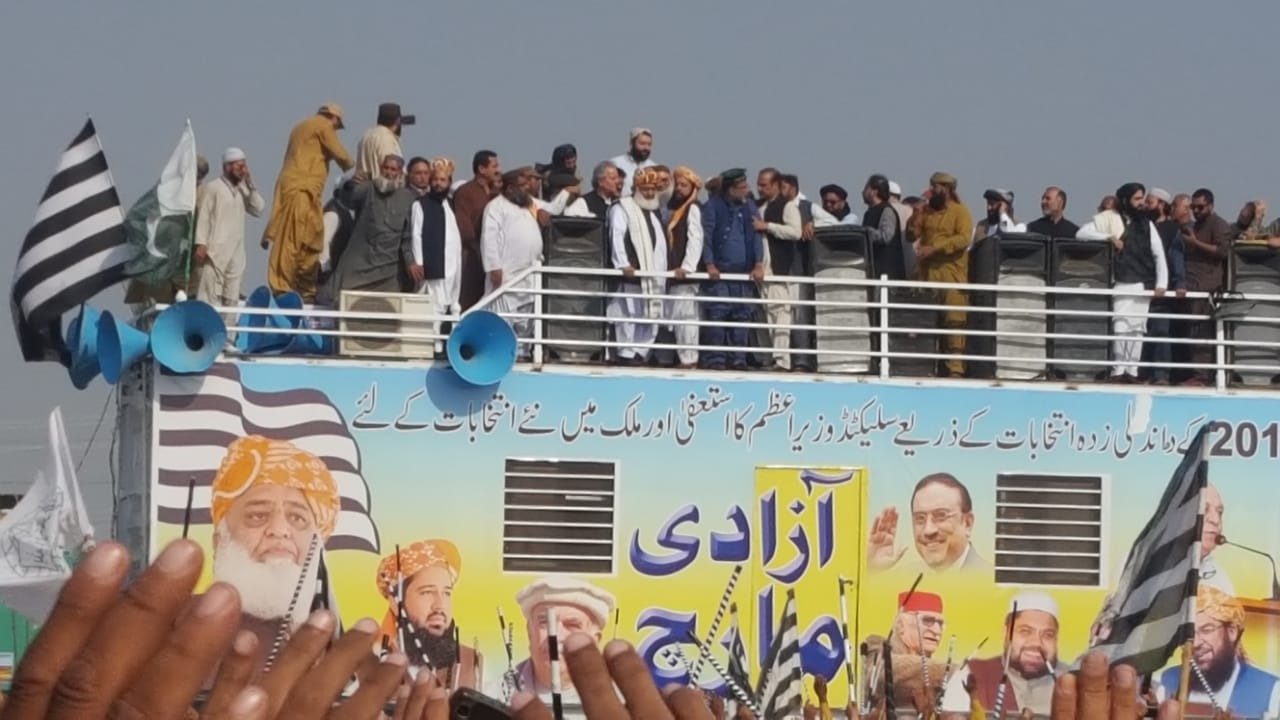
Protest marches and sit-ins aimed at toppling governments may be democratic moves but they are hardly a good sign for democracy

Prime Minister Imran Khan is getting a taste of his own medicine. Agitators are descending on Islamabad the way Khan did in 2014. Whatever his real motives, Maulana Fazlur Rehman ostensibly has a valid point to stage a sit-in: elections of 2018 were rigged in favour of the PTI.
The government is facing a crisis of legitimacy. One of the lessons learnt from the 2018 elections is that a government which is formed after a controversial election lacks legitimacy. Such a government can hardly claim the confidence of its citizenry.
Political parties agree that the 2018 election, which established the incumbent federal government of Pakistan Tehreek-e-Insaf, was not free and fair. From the beginning, there was talk of protests and agitation to challenge the government.
The inability to deliver on promises further dented the government’s credibility. Nothing has negatively affected the PTI government more than unfulfilled expectations after the 2018 elections. Many people believed in Imran Khan and his capacity to deliver where traditional political leaders had failed.
Today, many of those people are disillusioned. They are reeling under the burden of unprecedented high cost of living. Rising taxes of various types have hardly brought a semblance of relief for the downtrodden. Heavy external borrowing, something the PTI promised to end, has continued.
That corruption will end and the country will start its journey on the path of economic development and prosperity was PTI’s promise. The so-called slogan of bringing about a change has become a nightmare with disastrous consequences.
That democracy is not suited to our country is a strongly-advocated belief of certain quarters in Pakistan. These people have a two-fold argument; they are more interested in economic development which, they contend, is the collective good of the society. For them, democracy doesn’t matter much. Development under a democratic system is a time-consuming process, they argue. Secondly, citizens are lacking in their judgment when it comes to electing good leaders.
The analysis fails to answer why democracy has been more successful and led to economic development in India which also inherited a parliamentary system from the British Raj.
What these people fail to understand is that democracy takes time to bear fruit. It is an evolutionary process. We have lost more than 33 years of our precious post-independence existence to military dictatorships. We could have had at least six more democratically elected governments had democracy been allowed to function no matter how fragile a dispensation might have been.
When democratic rule returned on occasions, it was weakened only to be ruined by behind-the-scene moves. Thus, the democratic system could not deliver to the satisfaction of citizenry. Unlike our case, in India, democracy was allowed to evolve, grow and prosper.
The second argument is also problematic. Accountability is built in democracy. Voters are the judges. Let free and fair elections take care of the corrupt politicians and leaders. Free, fair and regular elections work as sieve to filter out the undesirable leaders. The public, especially voters, are rational judges. The real problem is that they have been denied the opportunity to judge their rulers.
Imran Khan and his PTI sold false dreams of change to the voters. There are no shortcuts to development and progress. Things do not change for the better overnight. Systematic changes are gigantic in nature. They need a lot of time to take hold.
Individuals matter less when it comes to changing systems. A change at the top to bring about ‘change’ to the every last rung of society seems to have failed. To strengthen the system, we have to strengthen our democracy.
Since societal changes take place at a slow pace, they become entrenched with the passage of time. If democracy is to get strengthened it should be allowed to continue no matter how compromised it seems under the incumbent government.
Democracy has to go through certain stages to be mature enough to deliver. The marches, sit-ins and other similar actions aimed at toppling governments may be inherently democratic moves but they are hardly a good sign for democracy.
The sit-ins are the undoing of political stability and democracy in our case. Investors seek political stability which can hardly be guaranteed in a fragile democracy like ours. Agitation makes a polity susceptible to intervention by non-democratic forces either as mediators or unwanted new rulers.